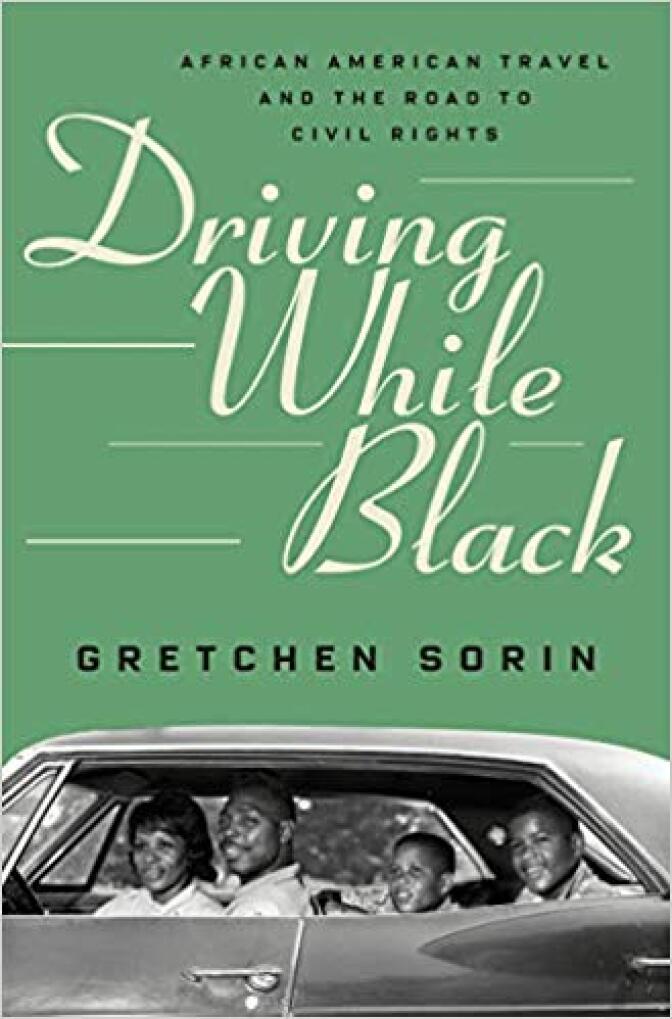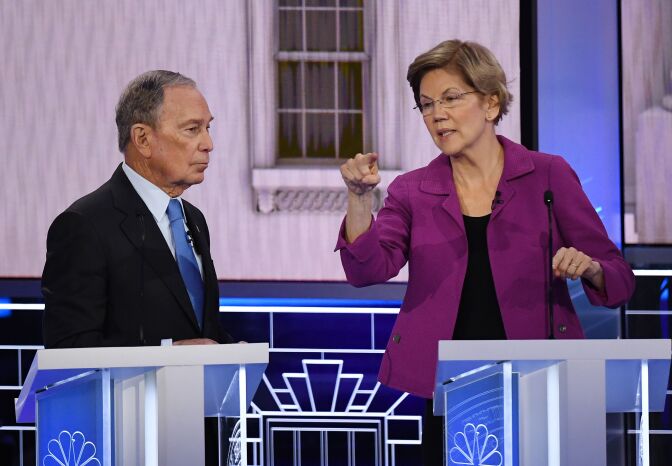Today on AirTalk, we analyze the firey debate performance Democrats delivered last night and its impact ahead of the Nevada caucuses. Also on the show, we give an update on local political races with the 'The Denkmann Report'; look at what it meant to drive while black before the civil rights era; and more.
Dem Candidates Come Out Swinging During Las Vegas Debate. How Does The Rhetoric Sit With Voters?
Six Democratic candidates took the stage during Wednesday night’s debate in Las Vegas. Former New York Mayor Michael Bloomberg, who’s spent more than $300 million of his own money on ads, only qualified just days before the debate.
Various analyses from the night did not paint a pretty picture for Bloomberg, with experts saying he came into the night overconfident and unprepared. Sen. Elizabeth Warren made aggressive arguments against the former mayor. Sen. Amy Klobuchar and former South Bend, Ind. Mayor Pete Buttigieg sparred with each other over several issues, including their amount of experience. Former VP Joe Biden continued with his attempt to convince voters he’s the best candidate to take on President Donald Trump. Some commentators labeled Sen. Bernie Sanders as the one with the edge coming out of the debate. It was indeed a night of heated exchanges, without much fire aimed at Trump himself. So, how does this fiery rhetoric sit with voters though?
Today on AirTalk, Larry sits down with an expert on political rhetoric to recap the night’s events. We want to know your thoughts. Did the rhetoric from the debate encourage you to shift your support to a different candidate? Join the conversation by calling 866-893-5722.
Guest:
Mitchell McKinney, professor of communication and the director of the Political Communications Institute at the University of Missouri; his research interests include presidential debates, presidential rhetoric and political campaigns; he tweets
Should Nurse Practitioners Be Given More Autonomy?
In an effort to address California’s dire physician shortage, legislation that is working its way through the state legislature would allow nurse practitioners who receive special training and certification to practice on their own and without needing the agreement that is currently required from a supervising physician that outlines what kind of care and treatment the NP can provide.
If the proposed law sounds familiar, it’s because the idea has been legislated before, both here in California and elsewhere. 22 other states and the Veterans Administration have created similar carve outs for NPs in an effort to meet the demand for care. The new law, which was introduced last year and passed the State Assembly last month, would not expand the scope of the care NPs can provide but instead remove the supervisory rule that requires a physician be at least on-call, if not physically present, during the patient’s visit with the practicing NP. Supporters of the legislation say given that more than 58 percent of NPs in California provide primary care, the law would not only address the state’s doctor shortage but also provide access to care for underserved patients in rural areas and low income neighborhoods and potentially attract other NPs to come to California where they can practice more freely.
But doctors and groups like the California Medical Association that represent them have pushed back on the idea in the past, arguing that allowing NPs to practice independently could lead to lapses in care because while they are well-trained, physicians argue, they only complete a fraction of the hours of clinical training time that those on the physician track do. The CMA says it supports a solution that involves improving physician graduation rates and finding ways to incentivize doctors to work in underserved areas, something that they note AB 890 does not require.
Today on AirTalk, we’ll hear perspectives from both nurse practitioners and doctors about the legislation. If you’re a licensed physician or NP and would like to share your perspective, join the live conversation by calling 866-893-5722.
Guests:
Theresa Ullrich, licensed family nurse practitioner with St. Joseph’s Hospital in Orange, CA and immediate past president of the California Association for Nurse Practitioners (CANP), an organization representing more than 22,000 registered nurse practitioners statewide; CANP is also part of “Close The Provider Gap,” a coalition of groups that support AB 890
Janus Norman, senior vice president of governmental relations for the California Medical Association, a professional organization representing 48,000 physicians statewide; the CMA has signed on in opposition to the bill
The Denkmann Report: City Council Races, Bloomberg Pays Californians To Post About Him, Vote Centers Set To Open And More
California’s primary is rapidly approaching. Each week, Larry is checking in with KPCC politics reporter Libby Denkmann as she follows all things voting in SoCal. Here are some of the headlines she’s watching this week:
City Council races: CD 14 (Lee-Lundquist rematch), CD 4 (Ryu reelection with several challengers), and Kevin De Leon/Mark Ridley Thomas likely returning to city council and then launching mayoral campaigns
Bernie Sanders, who just topped the PPIC poll, is back in our neck of the woods Friday to sweep through SoCal (Santa Ana + Bakersfield) -- what his possible dominance could mean for CA delegate distribution
Michael Bloomberg, banking on a Super Tuesday strategy, is paying Californians to post about him on social media
Vote centers start to open up this weekend in Los Angeles and Orange County
Have questions for Libby about the upcoming races? Join the live conversation and ask your question by calling 866-893-5722.
For more from Libby on LAist about how you can prepare yourself to vote on March 3, click here. You can also check out KPCC’s Voter Game Plan for resources to help you register, prepare to vote and learn about candidates.
Guest:
Libby Denkmann, KPCC politics reporter; she tweets
2020: Dem Candidates’ Campaigning Strategies In Nevada And Beyond, Post Debate
From the opening bell, Democrats savaged New York billionaire Mike Bloomberg and raised pointed questions about Bernie Sanders’ take-no-prisoners politics during a contentious debate Wednesday night that threatened to further muddy the party’s urgent quest to defeat President Donald Trump.
The ninth debate of this cycle featured the most aggressive sustained period of infighting in the Democrats’ yearlong search for a presidential nominee.
In related news, the Wall Street Journal has reported that Michael Bloomberg has been pursuing an unusual campaign strategy: paying people to text their friends and post their support on personal social media. Some social media platforms are changing their sponsored content disclosure policies as a result, and political watchers are waiting on responses from the FEC and FCC.
We dive into Bloomberg’s unusual social media strategy and get a sense of the scene on the ground in Nevada after last night’s debate and ahead of the caucuses on February 22.
With files from the Associated Press
Guests:
Michelle Rindels, Nevada-based politics reporter for the Nevada Independent; she tweets
David Siders, national political correspondent for Politico; he tweets
Georgia Wells, tech reporter for The Wall Street Journal, where her recent piece written with Jeff Horowitz is “Bloomberg Bankrolls a Social-Media Army to Push Message”; she tweets
Driving While Black In The Pre-Civil Rights Era
America was forever changed by the automobile. With the production of affordable cars in the early 20th century, people could travel the country on their own time. But for African Americans, traveling by car was especially meaningful -- and challenging, writes historian and professor Gretchen Sorin in her new book Driving While Black.

However, African Americans were not allowed to travel freely until the later part of the 20th century. During the Jim Crow Era, racial discrimination was widespread across the entire United States, sometimes even written into the law. Many white-owned businesses were segregated or refused to serve African-Americans, and it was much easier for a white family to take to the open road for a vacation than a black family.
But as Sorin writes, a new economy for black road-trippers emerged in time. The famous Green Book, for example, documented restaurants and hotels across the country where African Americans were welcome to stop. This increased level of mobility, Sorin writes, was a weapon against segregation and contributed to the Civil Rights Movement's successes.
In addition to historical records, Sorin's book draws on her family's experience with driving: the places they visited, the worries they felt, and the precautions her parents took to arrive safely at their destination.
Guest:
Gretchen Sorin, author of “Driving While Black: African American Travel And The Road To Civil Rights” (Liveright Publishing, 2020); professor and director of the Cooperstown Graduate Program at the State University of New York College at Oneonta




